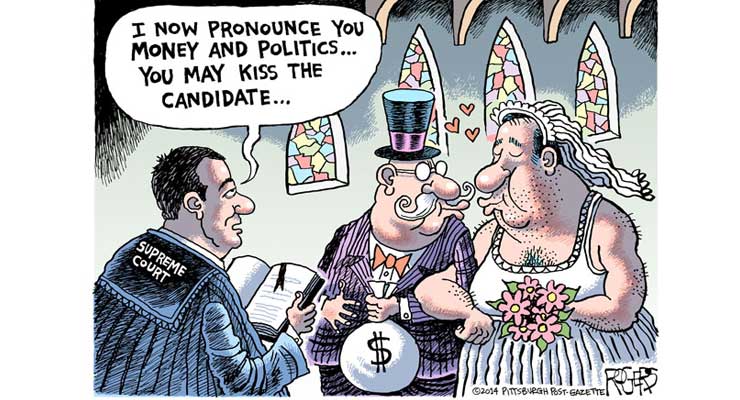
Populist campaigns reflect a general revulsion to the money politics era that has consumed our democracy
From the Brennan Center‘s Victoria Bassetti:
As Bernie Sanders and Donald Trump have caught fire, the political establishment has made a show of scratching its collective head to figure out why. But they already know.
“Trump has risen because voters see him as authentic, independent, direct, firm, — and believe he can’t be bought,” a senior Republican operative wrote in a widely circulated memo last September. The italics are his.
The memo writer, Ward Baker, is executive director of the National Republican Senatorial Committee (NRSC). His job is to help GOP Senate candidates win seats even as their party is being led by a “misguided missile.” (His words.)
So how is a little ol’ Senate GOP candidate supposed to ride this misguided missile and survive its “farcical attacks”? By ignoring it, for one thing. “Don’t get drawn into every Trump statement and every Trump dust-up,” the memo counsels. Baker also advises candidates not insult people, wear normal clothes, visit voters in their homes, have workers explain how they do their jobs, and “own the future.”
Seven, single-spaced pages of cliched image and issue management. But not a single word about how not to “be bought,” the very thing he had just called “Trump lesson #1.”
Policy differences aside, Trump and Sanders have successfully harnessed intense and widespread voter discontent with how campaign finance rigs the system. Every third phrase out of Sanders’ mouth is “Wall Street.” Trump, meanwhile, never tires of saying his campaign is self-financed, and that “I’m working for you.”
By attacking campaign money, the two have established bedrock so solid that they can advocate fantastical policies yet withstand most attacks.
Both parties are now faced with populist revolts rooted in a passionate rejection of Big Money. You might think that candidates and party organizations would now rethink how they’re bankrolled. But not so far.
In the months following Baker’s insight, the NRSC continued fundraising at a furious pace. So did the Democratic counterpart to the NRSC. And individual Senate and House candidates followed suit. It looks like 2016 will be the most expensive batch of Senate and House races in history.
Unsurprisingly, donors are doing what they do best: “forking over piles of money,” as Politicoreported last week. “Republican business groups and operatives are going all out to save their majorities in Washington, stepping up fundraising outreach in recent weeks to protect the GOP-controlled Congress. Contributors are responding … to contain down-ballot collateral damage from a potential Trump nomination.”
In fairness, they really don’t know what else to do. Campaigns and political parties are like battleships. They are large, dangerous, monstrously expensive, and turn very slowly. Moreover, only the rarest of federal Senate or House candidates is either a billionaire or can appeal to enough small donors to raise meaningful money.
Meanwhile, possibly the most ironic twist of all in this crazy campaign season comes from this year’s Wisconsin Senate race. In a repeat of the 2010 contest, Republican incumbent and multi-millionaire businessman Ron Johnson is facing off against campaign finance reform folk hero Russ Feingold. Johnson was Trump-like in 2010, when he mostly self-funded his race and beat Feingold.
This year, there’s a turnabout. Johnson is not self-funding. He’s now raising money, having accumulated a total of $9.7 million by the end of 2015, the most recent numbers available. He’s also got super-PACs spending for him. He’s taking money from campaign finance baddies like Las Vegas gambling mogul Sheldon Adelson.
Feingold, who has always had modest personal assets, has abandoned his longstanding pledge that he would raise the majority of his money from Wisconsinites. Feingold raised $7.4 million in 2015 and said that 67 percent of his money in the last quarter came from out of state. Overall though, Feingold said 25,000 Wisconsinites contributed to his campaign last year, mostly in the form of small donations.
Is it any surprise that the last poll, taken in February, shows Feingold leading by 11 points?
Leave a Reply